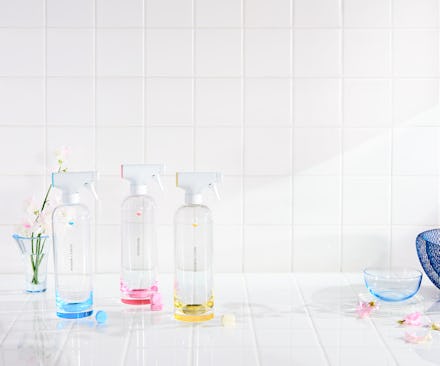This startup wants to eliminate single-use plastic by replacing your Windex with a tablet

When Sarah Paiji Yoo first learned that microplastics — tiny particles of broken down plastic — are polluting the food we eat and water we drink, she was stunned. Recent studies have shown that not only are there more than 5 trillion pieces of plastic in the world’s oceans, but also that microplastics can be found in just about everything we consume, including bottled water. The information was enough to convince Paiji Yoo to cut back on her own single-use plastic consumption — but she quickly realized that was easier to do with some products than others. “As well-intentioned as I was, I realized that as a consumer, I just didn’t have a lot of choice,” she told Mic. Ultimately, I needed [things like] window [and] glass cleaner, and all these products came packaged in just one way: in plastic.”
Seeing aisles upon aisles of cleaning products packaged in disposable plastic containers — which consumers buy, toss or recycle, then either buy again or refill from different plastic containers — she had that classic, “there has to be a better way” moment. “One morning it just hit me: These products are mostly water,” she said. “You’re paying for a plastic package and water, which you already have at home. I started to wonder, ‘Could these products just be powder or tablet, and you can just refill a bottle that you already have, or that you would reuse over and over again, and just add your own water at home?’”
Fast forward a year-and-a-half later, and we have the answer in the form of Blueland, a brand new company (debuting this Earth Day) co-founded by Paiji Yoo, along with entrepreneur John Mascari and Method’s former director of research and development, Syed Naqvi. Blueland’s primary goal is to eliminate the need for single-use plastic packaging, starting with their first product launch: a collection of 20-ounce “Forever” bottles and tablets that you can dissolve in water to create cleaning solutions. The collection currently includes three cleaners (Multi-Surface, Glass + Mirror, and Bathroom), which you can buy together (as the $29 Clean Up Kit) or individually (as the $12 Starter Sets). Either way, the bottles and tablets come together — for your first purchase. The idea, then, is to reuse those same bottles and only reorder the tiny tablets that go in them (for $2 per refill).
Not only does this design eliminate the need for use-and-discard plastic cleaning bottles; but according to the brand, the refill tablets are 300 times lighter, 200 times smaller, and 30 times cheaper to ship than the average cleaning product — which, as Paiji Yoo said, “just makes sense for a world that is increasingly driven by commerce.”
But Blueland’s mission wasn’t only about cutting out plastic bottles; as Paiji Yoo explained, they also focused on creating products that are non-toxic and environmentally friendly. The company partnered with Cradle-to-Cradle, a non-profit organization that certifies consumer products based on a set of environmental standards. “They are evaluating every aspect of our product and supply chain, as well as the materials we use [and] how those materials are treated [and] disposed of,” Paiji Yoo said. “In partnering with them, we’ve made sure both our products as well as our packaging are Platinum certified [by Cradle-to-Cradle]. So, for example...all our tablets come packaged in a recyclable and compostable paper packaging, which is really great because in the world of cleaning products...refills as they exist today [are] just either a larger plastic bottle that you’re using or refills are coming in these thicker plastic bags that actually aren’t recyclable.”
Inside that packaging, Blueland’s tablet formulations (which are made from 94% bio-based, non-toxic ingredients) are not only certified Platinum by Cradle-to-Cradle, but also free of all ingredients on the Environmental Working Group’s EWG Verified restricted list. Paiji Yoo noted the company is also currently undergoing the certification process to be added to the upcoming EWG Verified Cleaning Products database.
And then there are the bottles. Paiji Yoo and her team considered and gathered feedback on using both glass and aluminum before ruling them out (the former is too fragile, while the latter’s opacity meant consumers couldn’t see the dissolving tablets and resulting solution) and landing on acrylic. But while acrylic is indeed a form of plastic, Paiji Yoo noted they worked closely with Cradle-to-Cradle to source the material and come up with BPA-free bottles made to last without breaking down or leaching harmful chemicals. “We call our bottle the Forever Bottle to really drive home this point that when you acquire this bottle, you should re-use it,” Paiji Yoo said. “And when you reuse it, that’s how you take other bottles out of the system.”
Ultimately, “part of this journey has been, as we’ve gone deep, realizing just how much greenwashing there is out there,” Paiji Yoo said, referring to the practice of companies deceptively using the “green” label in marketing or posing as an environmentally friendly organization without the action and science to back it up. “[We] really wanted to make sure we were building this company the right way. We know it’s hard when you’re building a business, there are certainly a lot of tradeoffs that can lead a business to choosing profit or timelines or other things over the environment — and I think that’s how we got to the state of the world we’re in right now. Part of all of this is we really wanted to prove to ourselves as much as anyone that it is possible to build a company with the goals of both profit and purpose, and do things a better way.”
Blueland’s inaugural kits are available on their website starting Earth Day, April 22, and the company plans to introduce even more products in the coming months.